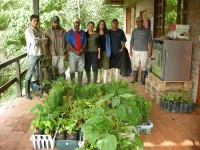(Press-News.org) A new study from researchers at the Gerald J. and Dorothy R. Friedman School of Nutrition Science and Policy at Tufts University, which published in Nature Medicine on January 6, estimates that 2.2 million new cases of type 2 diabetes and 1.2 million new cases of cardiovascular disease occur each year globally due to consumption of sugar-sweetened beverages.
In developing countries, the case count is particularly sobering. In Sub-Saharan Africa, the study found that sugar-sweetened beverages contributed to more than 21% of all new diabetes cases. In Latin America and the Caribbean, they contributed to nearly 24% of new diabetes cases and more than 11% of new cases of cardiovascular disease.
Colombia, Mexico, and South Africa are countries that have been particularly hard hit. More than 48% of all new diabetes cases in Colombia were attributable to consumption of sugary drinks. Nearly one third of all new diabetes cases in Mexico were linked to sugary drink consumption. In South Africa, 27.6% of new diabetes cases and 14.6% of cardiovascular disease cases were attributable to sugary drink consumption.
Sugary beverages are rapidly digested, causing a spike in blood sugar levels with little nutritional value. Regular consumption over time leads to weight gain, insulin resistance, and a host of metabolic issues tied to type 2 diabetes and heart disease, two of the world’s leading causes of death.
“Sugar-sweetened beverages are heavily marketed and sold in low- and middle-income nations. Not only are these communities consuming harmful products, but they are also often less well equipped to deal with the long-term health consequences,” says Dariush Mozaffarian, senior author on the paper and director of the Food is Medicine Institute at the Friedman School.
As countries develop and incomes rise, sugary drinks become more accessible and desirable, the authors say. Men are more likely than women to suffer the consequences of sugary drink consumption, as are younger adults compared to their older counterparts, the researchers say.
“We need urgent, evidence-based interventions to curb consumption of sugar-sweetened beverages globally, before even more lives are shortened by their effects on diabetes and heart disease,” says Laura Lara-Castor, NG24, first author on the paper who earned her Ph.D. at the Friedman School and is now at the University of Washington.
The study’s authors call for a multi-pronged approach, including public health campaigns, regulation of sugary drink advertising, and taxes on sugar-sweetened beverages. Some countries have already taken steps in this direction. Mexico, which has one of the highest per capita rates of sugary drink consumption in the world, introduced a tax on the beverages in 2014. Early evidence suggests that the tax has been effective in reducing consumption, particularly among lower-income individuals.
“Much more needs to be done, especially in countries in Latin America and Africa where consumption is high and the health consequence severe,” says Mozaffarian, who is also Jean Mayer Professor of Nutrition at the Friedman School. “As a species, we need to address sugar-sweetened beverage consumption.”
Research reported in this article was supported by the Gates Foundation, the American Heart Association, and the National Council for Science and Technology in Mexico. Complete information on authors, methodology, limitations, and conflicts of interest is available in the published paper. The content is solely the responsibility of the authors and does not necessarily represent the official views of the funders.
END
New study links millions of diabetes and heart disease cases globally to sugary drinks
Research reveals the health impacts of consuming sugar-sweetened beverages
2025-01-06
ELSE PRESS RELEASES FROM THIS DATE:
Fluoride exposure and children’s IQ scores
2025-01-06
About The Study: This systematic review and meta-analysis found inverse associations and a dose-response association between fluoride measurements in urine and drinking water and children’s IQ across the large multi-country epidemiological literature. There were limited data and uncertainty in the dose-response association between fluoride exposure and children’s IQ when fluoride exposure was estimated by drinking water alone at concentrations less than 1.5 mg/L. These findings may inform future comprehensive public health risk-benefit assessments of fluoride exposures.
Corresponding ...
Trends in treatment need and receipt for substance use disorders in the US
2025-01-06
About The Study: This cross-sectional study’s analysis underscores a public health crisis of substance use disorder. The prevalence of substance use disorder surged during the COVID-19 pandemic, yet the receipt of treatment declined initially as health care services were disrupted. Treatment rates began to recover in 2022, likely due to reopened treatment programs and increased telehealth use.
Corresponding Author: To contact the corresponding author, Milap C. Nahata, PharmD, MS, email nahata.1@osu.edu.
To access ...
Gender-affirming medications rarely prescribed to US adolescents
2025-01-06
Embargoed for release: Monday, Jan. 6, 2025, 11:00 AM ET
Key points:
Less than 0.1% of U.S. adolescents were transgender and gender diverse (TGD) and prescribed puberty blockers or gender-affirming hormones in a study of private insurance claims representing 5.1 million patients ages eight to 17.
No TGD patients under age 12 received hormones.
According to the researchers, the findings counter a growing concern among policymakers that gender-affirming care is frequently over-prescribed to children.
Boston, MA—Puberty blockers and gender-affirming hormones are rarely prescribed to U.S. transgender and gender diverse (TGD) adolescents, according to a new study from researchers ...
Burden of infections in early life and risk of infections and systemic antibiotics use in childhood
2025-01-06
About The Study: This longitudinal cohort study suggests that early-life infection burden may continue throughout childhood and is associated with later antibiotic treatments independent of social and environmental risk factors. These findings are important for prognosis and follow-up of children experiencing a high burden of common infections in early life.
Corresponding Author: To contact the corresponding author, Nicklas Brustad, MD, PhD, email nicklas.brustad@dbac.dk.
To access the embargoed study: Visit our For The Media website at this link https://media.jamanetwork.com/
(doi:10.1001/jamanetworkopen.2024.53284)
Editor’s ...
New study shows plummeting STIs with doxyPEP use
2025-01-06
Key Takeaways:
A new study in JAMA Internal Medicine led by the Harvard Pilgrim Health Care Institute examined whether doxycycline post-exposure prophylaxis (doxyPEP) was associated with declines in bacterial sexually transmitted infections in routine care.
The study represents the largest cohort of doxyPEP recipients reported globally to date.
Findings showed doxyPEP was associated with a 79% reduction in chlamydia, 80% reduction in syphilis, and 12% reduction in gonorrhea.
Boston, MA — A new study has found that rates of chlamydia and syphilis plummet among people prescribed doxycycline for sexually transmitted ...
Newly discovered 'kiss and capture' mechanism explains the formation of Pluto and its largest moon
2025-01-06
Billions of years ago, in the frigid outer reaches of our solar system, two icy worlds collided. Rather than destroying each other in a cosmic catastrophe, they spun together like a celestial snowman, finally separating while remaining forever linked in orbit. This is how Pluto and its largest moon, Charon, originated, according to a new University of Arizona study that challenges decades of scientific assumptions.
A study led by Adeene Denton, a NASA postdoctoral fellow who conducted the research at the U of A Lunar and Planetary Laboratory, has revealed this unexpected "kiss and capture" mechanism, which could help scientists better ...
New method tracks the 'learning curve' of AI to decode complex genomic data
2025-01-06
Introducing Annotatability—a powerful new framework to address a major challenge in biological research by examining how artificial neural networks learn to label genomic data. Genomic datasets often contain vast amounts of annotated samples, but many of these samples are annotated either incorrectly or ambiguously. Borrowing from recent advances in the fields of natural language processing and computer vision, the team used artificial neural networks (ANNs) in a non-conventional way: instead of merely using the ANNs to make predictions, the group inspected the difficulty with which they learned to label ...
Nutrient enrichment: an emerging threat to tropical forests
2025-01-06
Tropical forests, often referred to as the "lungs of the Earth," are essential for sustaining life on our planet. They provide clean air, water, and unparalleled biodiversity. While deforestation due to slash-and-burn agriculture, mining, and logging remains the most recognized threat, less visible but equally dangerous forces are at work. A new study reveals that nutrient enrichment – driven by human activities such as agriculture and fossil fuel combustion – poses a significant risk to the delicate dynamics of tropical forests.
The research, conducted by an international team of scientists ...
Scientists identify low-cost adsorbents for removing impurities from landfill gas
2025-01-06
Landfill gas, a mixture of gases produced when garbage breaks down within landfills, contains unwanted traces of siloxane compounds, which are chemical structures containing silicon and oxygen bonds and are found in various products like cosmetics and cleaning agents. These compounds can damage the equipment used to generate energy from landfill gas. In new research published in Environmental Progress & Sustainable Energy, investigators have identified low-cost adsorbents for siloxane removal from landfill gas.
The research highlights the potential of ...
CDC grant funds initiatives for breast cancer patients
2025-01-06
Weill Cornell Medicine has received a five-year, $2.3 million grant from the Centers for Disease Control and Prevention to improve equitable access to care, quality of life and survival outcomes for young people with all stages of breast cancer.
The grant will enable Weill Cornell Medicine to enhance care coordination for patients and caregivers to optimize support of physical, mental, emotional, social and spiritual needs, while offering culturally relevant resources and targeted interventions. The initiative ...
LAST 30 PRESS RELEASES:
ASU researchers to lead AAAS panel on water insecurity in the United States
ASU professor Anne Stone to present at AAAS Conference in Phoenix on ancient origins of modern disease
Proposals for exploring viruses and skin as the next experimental quantum frontiers share US$30,000 science award
ASU researchers showcase scalable tech solutions for older adults living alone with cognitive decline at AAAS 2026
Scientists identify smooth regional trends in fruit fly survival strategies
Antipathy toward snakes? Your parents likely talked you into that at an early age
Sylvester Cancer Tip Sheet for Feb. 2026
Online exposure to medical misinformation concentrated among older adults
Telehealth improves access to genetic services for adult survivors of childhood cancers
Outdated mortality benchmarks risk missing early signs of famine and delay recognizing mass starvation
Newly discovered bacterium converts carbon dioxide into chemicals using electricity
Flipping and reversing mini-proteins could improve disease treatment
Scientists reveal major hidden source of atmospheric nitrogen pollution in fragile lake basin
Biochar emerges as a powerful tool for soil carbon neutrality and climate mitigation
Tiny cell messengers show big promise for safer protein and gene delivery
AMS releases statement regarding the decision to rescind EPA’s 2009 Endangerment Finding
Parents’ alcohol and drug use influences their children’s consumption, research shows
Modular assembly of chiral nitrogen-bridged rings achieved by palladium-catalyzed diastereoselective and enantioselective cascade cyclization reactions
Promoting civic engagement
AMS Science Preview: Hurricane slowdown, school snow days
Deforestation in the Amazon raises the surface temperature by 3 °C during the dry season
Model more accurately maps the impact of frost on corn crops
How did humans develop sharp vision? Lab-grown retinas show likely answer
Sour grapes? Taste, experience of sour foods depends on individual consumer
At AAAS, professor Krystal Tsosie argues the future of science must be Indigenous-led
From the lab to the living room: Decoding Parkinson’s patients movements in the real world
Research advances in porous materials, as highlighted in the 2025 Nobel Prize in Chemistry
Sally C. Morton, executive vice president of ASU Knowledge Enterprise, presents a bold and practical framework for moving research from discovery to real-world impact
Biochemical parameters in patients with diabetic nephropathy versus individuals with diabetes alone, non-diabetic nephropathy, and healthy controls
Muscular strength and mortality in women ages 63 to 99
[Press-News.org] New study links millions of diabetes and heart disease cases globally to sugary drinksResearch reveals the health impacts of consuming sugar-sweetened beverages


